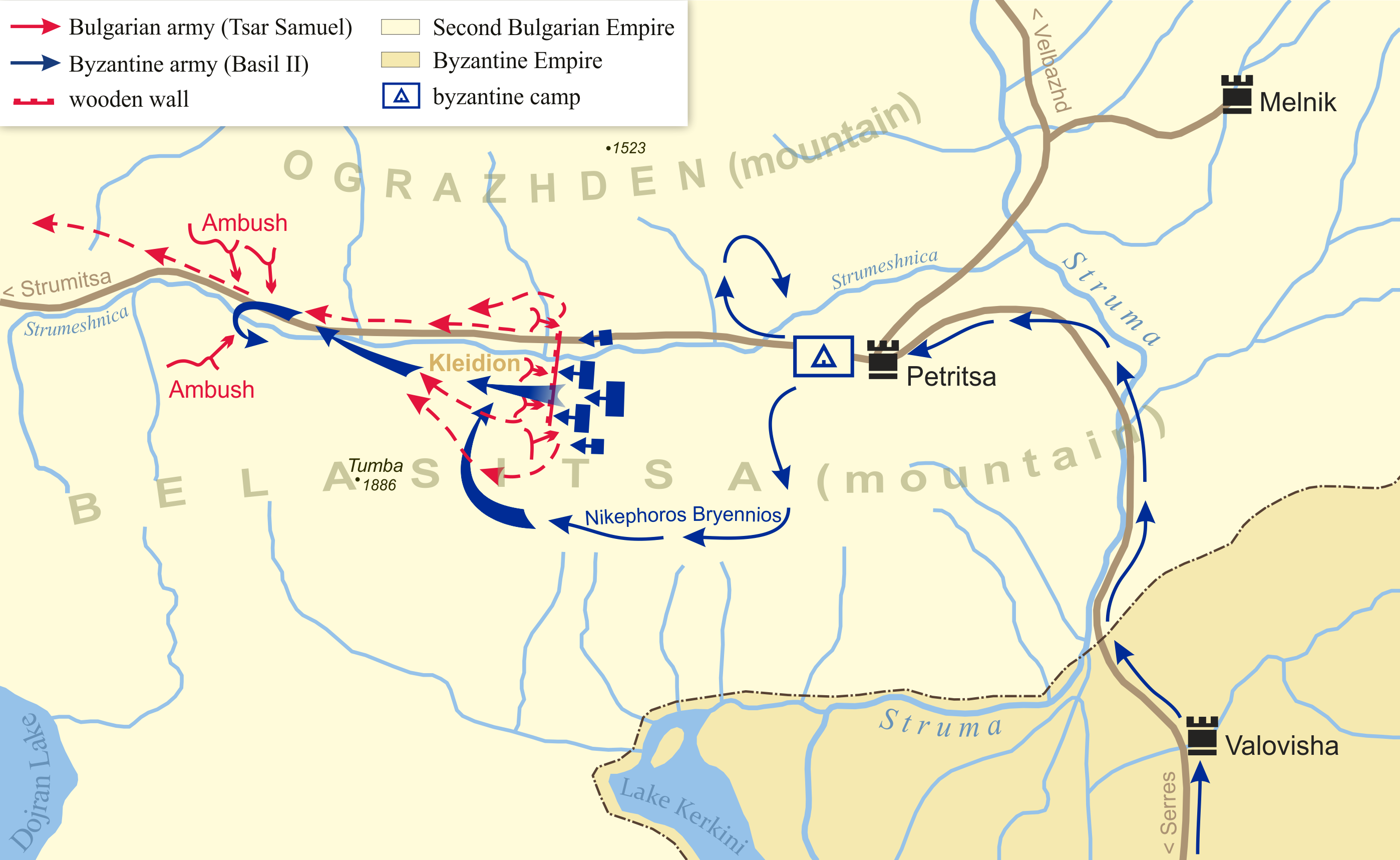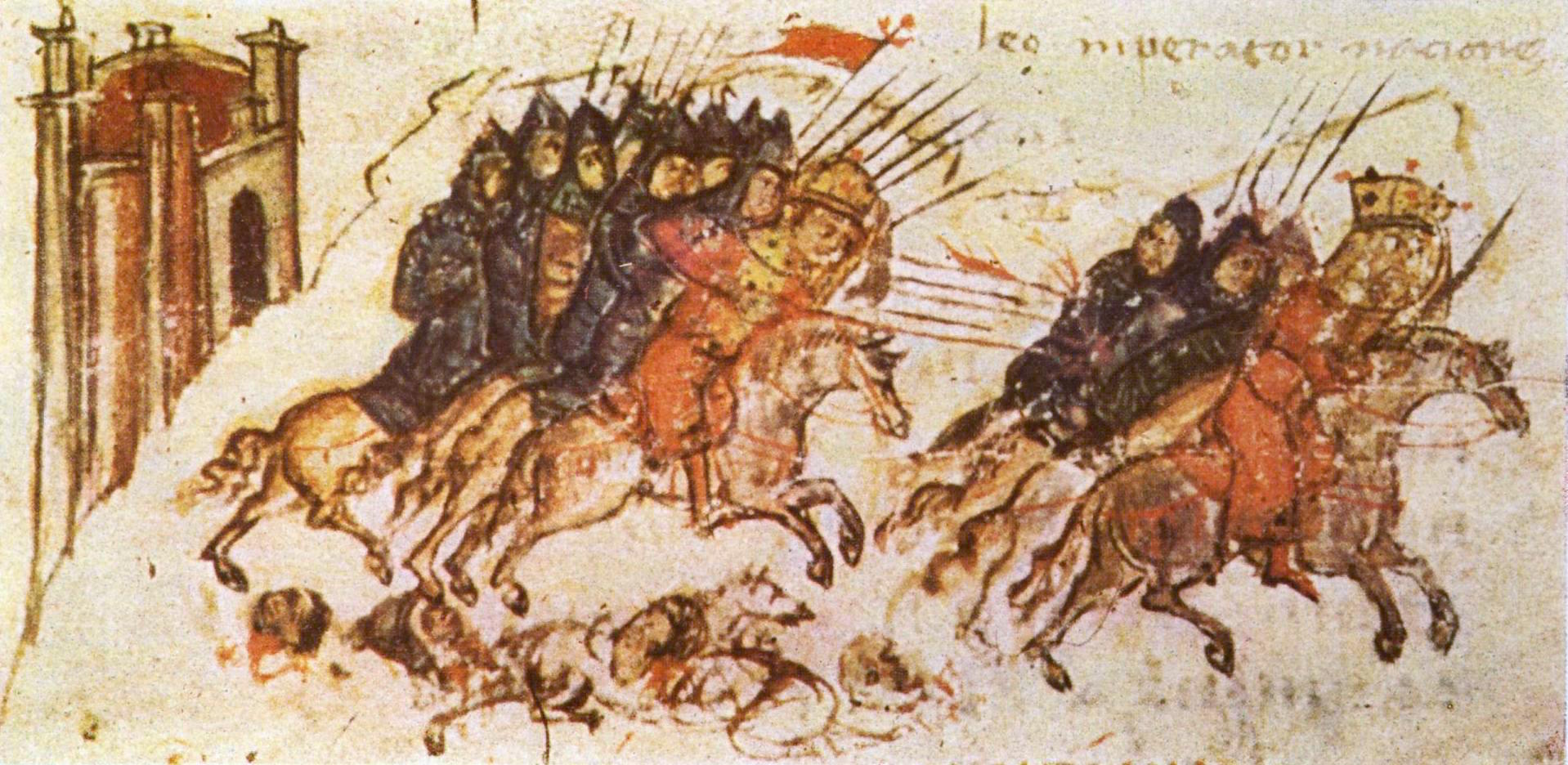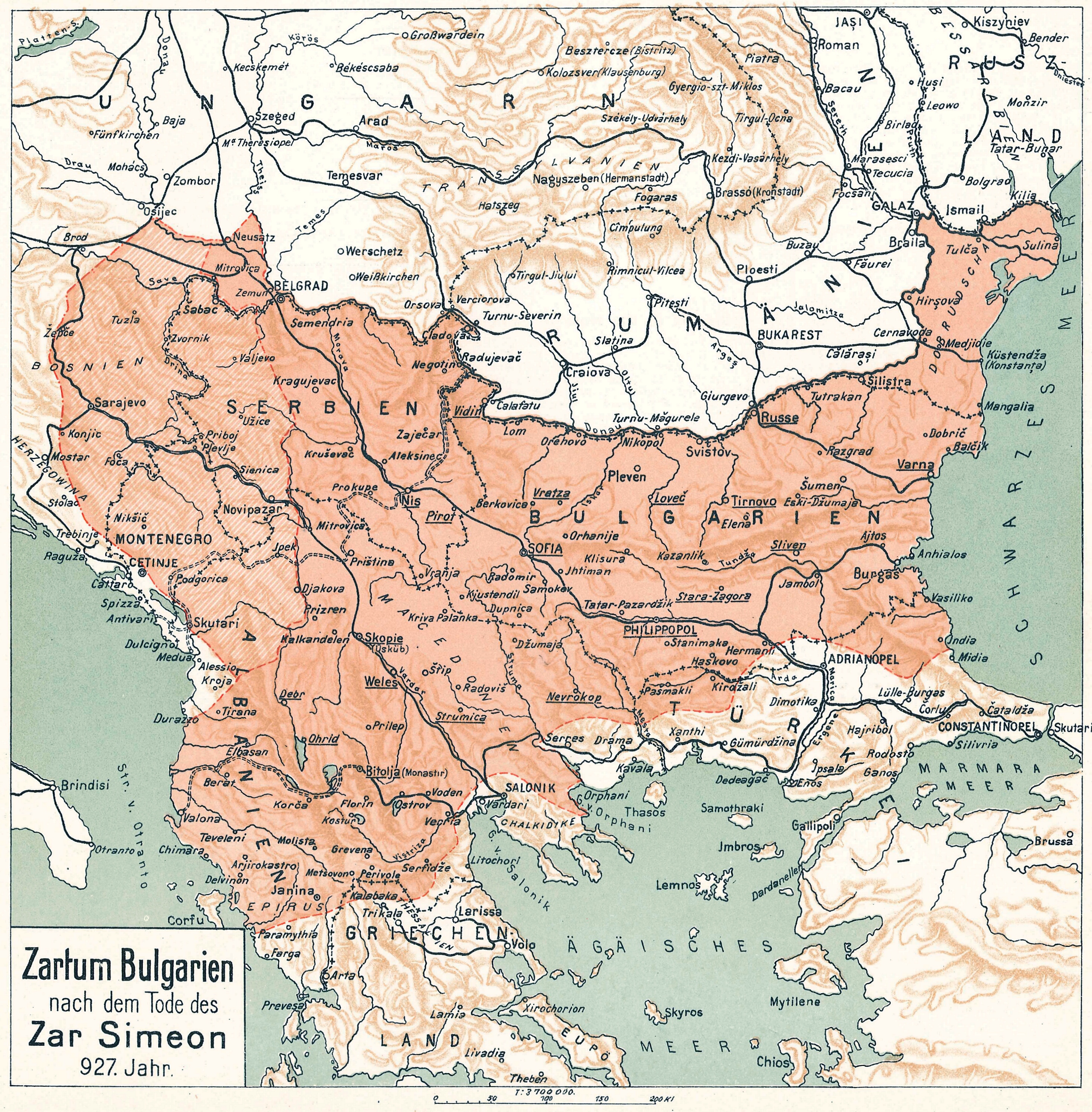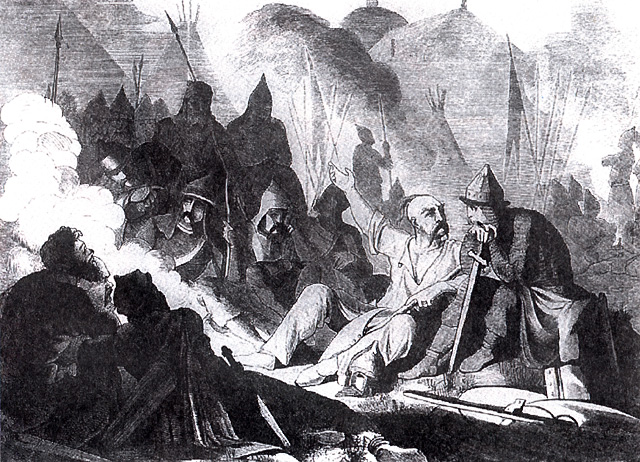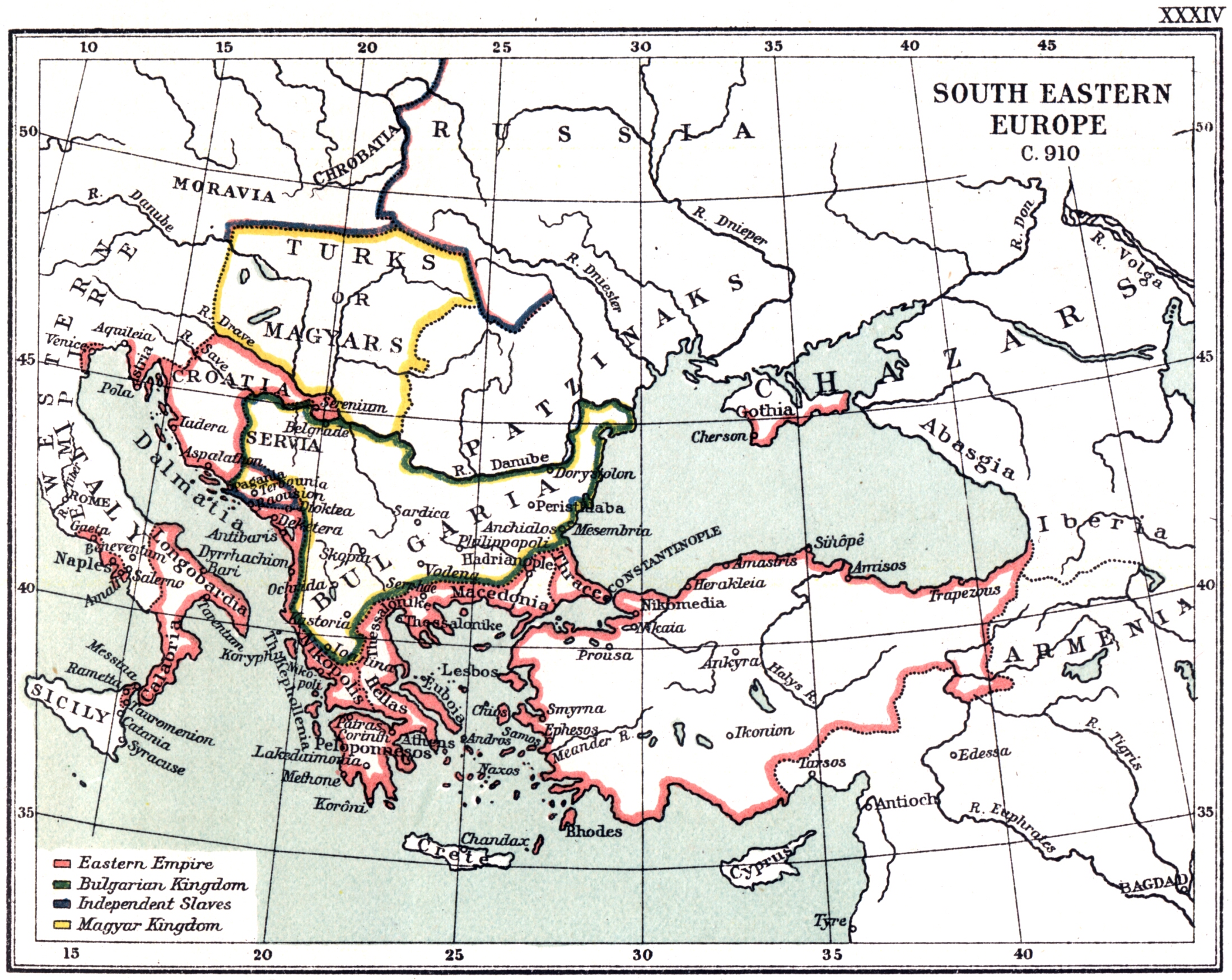|
Battle Of Kleidion
The Battle of Kleidion (; or Clidium, after the medieval name of the village of Klyuch, ; also known as the Battle of Belasitsa) took place on 29 July 1014, between the Byzantine Empire and the Bulgarian Empire. It was the culmination of the nearly half-century struggle between the Byzantine Emperor Basil II and the Bulgarian emperor Samuel in the late 10th and early 11th centuries. The result was a decisive Byzantine victory. The battle took place in the valley between the mountains of Belasitsa and Ograzhden, near the modern Bulgarian village of Klyuch. The decisive encounter occurred on 29 July with an attack in the rear by a force under the Byzantine general Nikephoros Xiphias, who had infiltrated the Bulgarian positions. The ensuing battle was a major defeat for the Bulgarians. Thousands of Bulgarian soldiers were captured and blinded by order of Basil II, who would subsequently be known as the "Bulgar-Slayer". Samuel survived the battle, but died two months later fro ... [...More Info...] [...Related Items...] OR: [Wikipedia] [Google] [Baidu] |
Byzantine–Bulgarian Wars
The Byzantine–Bulgarian wars were a series of conflicts fought between the Byzantine Empire and Bulgaria which began after the Bulgars conquered parts of the Balkan peninsula after 680 AD. The Byzantine and First Bulgarian Empire continued to clash over the next century with variable success, until the Bulgarians, led by Krum of Bulgaria, Krum, inflicted a series of crushing defeats on the Byzantines. After Krum died in 814, his son Omurtag negotiated a thirty-year peace treaty. Simeon I of Bulgaria, Simeon I had multiple successful campaigns against the Byzantines during his rule from 893 to 927. His son Peter I of Bulgaria, Peter I negotiated another long-lasting peace treaty. His rule was followed by a period of decline of the Bulgarian state. In 971 John I Tzimiskes, the Byzantine emperor, subjugated much of the weakening Bulgarian Empire by defeating Boris II of Bulgaria, Boris II and capturing Preslav, the Bulgarian capital. Samuel of Bulgaria, Samuel managed to stabiliz ... [...More Info...] [...Related Items...] OR: [Wikipedia] [Google] [Baidu] |
Bulgars
The Bulgars (also Bulghars, Bulgari, Bolgars, Bolghars, Bolgari, Proto-Bulgarians) were Turkic peoples, Turkic Nomad, semi-nomadic warrior tribes that flourished in the Pontic–Caspian steppe and the Volga region between the 5th and 7th centuries. They became known as Eurasian nomads, nomadic equestrians in the Volga-Ural region, but some researchers trace Bulgar ethnic roots to Central Asia. During their westward migration across the Eurasian Steppe, the Bulgar tribes absorbed other tribal groups and cultural influences in a process of ethnogenesis, including Iranian peoples, Iranic, Finno-Ugric peoples, Finno-Ugric, and Huns, Hunnic tribes. The Bulgars spoke a Turkic languages, Turkic language, the Bulgar language of the Oghur languages, Oghuric branch. They preserved the military titles, organization, and customs of Eurasian steppes as well as pagan shamanism and belief in the sky deity Tengri, Tangra. The Bulgars became semi-sedentary during the 7th century in the Pontic- ... [...More Info...] [...Related Items...] OR: [Wikipedia] [Google] [Baidu] |
Aron Of Bulgaria
Aron ( Bulgarian: Арон; died in 987/988 or 976) was a Bulgarian noble, brother of Emperor Samuel of Bulgaria and third son of ''komes'' Nicholas. After the fall of the eastern parts of the country under Byzantine occupation in 971, he and his three brothers David, Moses and Samuel continued the resistance to the west. They were called ''Cometopuli'' and ruled the country together, as the rightful heirs to the throne, Boris II and Roman were imprisoned in Constantinople. The residence of Aron was Serdica (modern-day Sofia), situated on the main road between Constantinople and Western Europe. He had to defend the area from enemy invasions and attack the Byzantine territories in Thrace. Treason and death In the beginning of the major campaign against the Byzantine Empire in 976, the two eldest brothers David and Moses perished but the Bulgarians achieved great successes including the return of north-eastern Bulgaria. During that time, the Byzantine Emperor Basil II had to fight ... [...More Info...] [...Related Items...] OR: [Wikipedia] [Google] [Baidu] |
Moses Of Bulgaria
Moses ( ; died ) was a Bulgarian noble, brother of Emperor Samuel of Bulgaria and second son of ''komes'' Nicholas. After the fall of the eastern parts of the Empire under Byzantine occupation in 971, he and his brothers David, Aron and Samuel continued the fight to the west. They ruled together and divided the realm into four parts. His lands were centred on Strumitsa, from where he had to launch attacks against the Aegean regions of the Byzantine Empire. In 976, the Bulgarian armies undertook a major assault from all borders and Moses lead his troops to Serres. During the siege of the town, he was mortally hit by a stone and then slain by an enemy sword. David and Aron also perished in the same year and the whole power fell in the hands of Samuel, who became Emperor in 997 after the death of last ruler from the previous dynasty, Roman. Family tree Another theory However, there is also another version about Moses's origin.Nicholas Adontz. Samuel l'Armenien, Roi des ... [...More Info...] [...Related Items...] OR: [Wikipedia] [Google] [Baidu] |
David Of Bulgaria
David (; , "beloved one") was a king of ancient Israel and Judah and the third king of the United Monarchy, according to the Hebrew Bible and Old Testament. The Tel Dan stele, an Aramaic-inscribed stone erected by a king of Aram-Damascus in the late 9th/early 8th centuries BCE to commemorate a victory over two enemy kings, contains the phrase (), which is translated as " House of David" by most scholars. The Mesha Stele, erected by King Mesha of Moab in the 9th century BCE, may also refer to the "House of David", although this is disputed. According to Jewish works such as the '' Seder Olam Rabbah'', '' Seder Olam Zutta'', and ''Sefer ha-Qabbalah'' (all written over a thousand years later), David ascended the throne as the king of Judah in 885 BCE. Apart from this, all that is known of David comes from biblical literature, the historicity of which has been extensively challenged,Writing and Rewriting the Story of Solomon in Ancient Israel; by Isaac Kalimi; page 32; ... [...More Info...] [...Related Items...] OR: [Wikipedia] [Google] [Baidu] |
Comitopuli
The Kometopuli dynasty (Bulgarian language, Bulgarian: , ; Medieval Greek, Byzantine Greek: , ) was the last royal dynasty in the First Bulgarian Empire, ruling from until the fall of Bulgaria under Byzantine Empire, Byzantine rule in 1018. The most notable member of the dynasty, Tsar Samuel of Bulgaria, Samuel, is famous for successfully resisting Byzantine conquest for more than 40 years. Sometimes the realm of the Cometopuli is called Western Bulgarian Kingdom or ''Western Bulgarian Empire''. Origin and members The actual name of the dynasty is not known. Cometopuli (Bulgarian language, Bulgarian: , ; Medieval Greek, Byzantine Greek: , ) is merely the nickname which is used by Byzantine historians to address rulers from the dynasty as its founder, Nicholas (komes), Nicholas, was a ''komes'' (governor, cognate to "count"; Medieval Greek, Byzantine Greek: , , from the Latin ''wikt:comes#Latin, comes''; Bulgarian language, Bulgarian: , ) either of the region of Sredets (medie ... [...More Info...] [...Related Items...] OR: [Wikipedia] [Google] [Baidu] |
Boris II Of Bulgaria
Boris II (; ; c. 931 – 977) was the List of Bulgarian monarchs, emperor (tsar) of First Bulgarian Empire, Bulgaria from 969 to 977 (in Byzantine captivity from 971). Boris II was the eldest surviving son of Emperor Peter I of Bulgaria and Irene Lekapene, Maria (renamed Eirene) Lekapena, a granddaughter of Emperor Romanus I, Romanos I Lekapenos of Byzantium. Boris had been born by 931, when he had visited Constantinople together with his mother. Nothing else is known of Boris II's life until 968, when he went to Constantinople again to negotiate a peace settlement with Emperor Nicephorus II, Nikephoros II Phokas, and apparently to serve as an honorary hostage. This arrangement was intended to put an end to the conflict between Bulgaria and Byzantium, who would now join forces against Prince Sviatoslav I of Kiev, whom the Byzantine emperor had pitted against the Bulgarians. In 969 a new Sviatoslav's invasion of Bulgaria, Kievan invasion defeated the Bulgarians again and Peter I a ... [...More Info...] [...Related Items...] OR: [Wikipedia] [Google] [Baidu] |
Preslav
The modern Veliki Preslav or Great Preslav (, ), former Preslav (; until 1993), is a city and the seat of government of the Veliki Preslav Municipality (Great Preslav Municipality, new Bulgarian: ''obshtina''), which in turn is part of Shumen Province, Bulgaria. Veliki Preslav is situated at an altitude of 132 m (92 m above sea level). A former village, it assumed the name of the medieval capital in 1878 and became a town in 1883. As of December 2009, it had a population of 8,951. Preslav was the capital of the First Bulgarian Empire from 893 to 972 and was one of the most important cities in medieval Southeastern Europe. The ruins of the city are situated in modern northeastern Bulgaria, some 20 kilometres southwest of the regional capital of Shumen, and are currently a national archaeological reserve. History The name of Preslav is of Slavic origin; apparently it was initially founded and functioned as a Slavic settlement until its fortification at the beginning of the ni ... [...More Info...] [...Related Items...] OR: [Wikipedia] [Google] [Baidu] |
Simeon I Of Bulgaria
Simeon I the Great (; ; ) ruled over Bulgaria from 893 to 927,Lalkov, ''Rulers of Bulgaria'', pp. 23–25. during the First Bulgarian Empire. Simeon's successful campaigns against the Byzantines, Magyars and Serbs led Bulgaria to its greatest territorial expansion ever, making it the most powerful state in contemporary Eastern and Southeast Europe. His reign was also a period of unmatched cultural prosperity and enlightenment later deemed the Golden Age of Bulgarian culture. During Simeon's rule, Bulgaria spread over a territory between the Aegean, the Adriatic and the Black seas.Bakalov, ''Istorija na Bǎlgarija'', "Simeon I Veliki". The newly independent Bulgarian Orthodox Church became the first new patriarchate besides the Pentarchy, and Bulgarian Glagolitic and Cyrillic translations of Christian texts spread all over the Slavic world of the time. It was at the Preslav Literary School in the 890s that the Cyrillic alphabet was developed. [...More Info...] [...Related Items...] OR: [Wikipedia] [Google] [Baidu] |
Sviatoslav I Of Kiev
Sviatoslav or Svyatoslav I Igorevich (; Old Norse: ''Sveinald''; – 972) was Prince of Kiev from 945 until his death in 972. He is known for his persistent campaigns in the east and south, which precipitated the collapse of two great powers in Eastern Europe, Khazaria and the First Bulgarian Empire. He conquered numerous East Slavic tribes, defeated the Alans and attacked the Volga Bulgars, and at times was allied with the Pechenegs and Magyars (Hungarians). Following the death of his father Igor in 945, Sviatoslav's mother Olga reigned as regent in Kiev until 962. His decade-long reign over the Kievan Rus' was marked by rapid expansion into the Volga River valley, the Pontic steppe, and the Balkans, leading him to carve out for himself the largest state in Europe. In 969, he moved his seat to Pereyaslavets on the Danube. In 970, he appointed his sons Yaropolk and Oleg as subordinate princes of Kiev and Drelinia, while he appointed Vladimir, his son by his housekeeper ... [...More Info...] [...Related Items...] OR: [Wikipedia] [Google] [Baidu] |
Sviatoslav's Invasion Of Bulgaria
Sviatoslav's invasion of Bulgaria was a conflict beginning in 967/968 and ending in 971, carried out in the eastern Balkans, and involving the Kievan Rus', Bulgaria, and the Byzantine Empire. The Byzantines encouraged the Rus' ruler Sviatoslav to attack Bulgaria, leading to the defeat of the Bulgarian forces and the occupation of the northern and north-eastern part of the country by the Rus' for the following two years. The allies then turned against each other, and the ensuing military confrontation ended with a Byzantine victory. The Rus' withdrew and eastern Bulgaria was incorporated into the Byzantine Empire. In 927, a peace treaty had been signed between Bulgaria and Byzantium, ending many years of warfare and establishing forty years of peace. Both states prospered during this interlude, but the balance of power gradually shifted in favour of the Byzantines, who made great territorial gains against the Abbasid Caliphate in the east and formed a web of alliances surrounding Bu ... [...More Info...] [...Related Items...] OR: [Wikipedia] [Google] [Baidu] |
Eastern Roman Empire
The Byzantine Empire, also known as the Eastern Roman Empire, was the continuation of the Roman Empire centred on Constantinople during late antiquity and the Middle Ages. Having survived the events that caused the fall of the Western Roman Empire in the 5th centuryAD, it endured until the fall of Constantinople to the Ottoman Empire in 1453. The term 'Byzantine Empire' was coined only after its demise; its citizens used the term 'Roman Empire' and called themselves 'Romans'. During the early centuries of the Roman Empire, the western provinces were Latinised, but the eastern parts kept their Hellenistic culture. Constantine I () legalised Christianity and moved the capital to Constantinople. Theodosius I () made Christianity the state religion and Greek gradually replaced Latin for official use. The empire adopted a defensive strategy and, throughout its remaining history, experienced recurring cycles of decline and recovery. It reached its greatest extent un ... [...More Info...] [...Related Items...] OR: [Wikipedia] [Google] [Baidu] |
